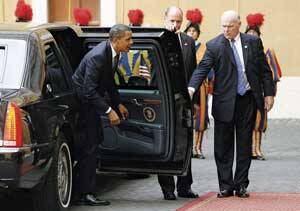The church’s positions on bioethical issues and matters of global social justice received marked attention during Pope Benedict XVI’s meeting with President Barack Obama on July 10 in Rome. Mr. Obama had traveled to Rome for the Group of 8 summit, an annual meeting of the world’s wealthiest industrialized countries, which had concluded that morning in L’Aquila, Italy. The G-8 summit had focused on the global economic crisis, climate change and global tensions.
The pope and Mr. Obama touched on each of these topics in their 35-minute closed-door meeting, as well as immigration and the issue of reuniting families, the Vatican said following the session. The two men also touched on international politics, such as the peace process in the Middle East, “on which there was general agreement,” the Vatican added. “Dialogue between cultures and religions, the global economic crisis and its ethical implications, food security, development aid—especially for Africa and Latin America—and the problem of drug trafficking” were all discussed. “Finally, the importance of educating young people everywhere in the value of tolerance was highlighted,” the Vatican said.
Pope Benedict and the president discussed other issues that represent “a great challenge for the future of every nation and for the true progress of peoples, such as the defense and promotion of life and the right to abide by one’s conscience,” according to the Vatican. During their time together, the pope gave Mr. Obama a signed copy of his encyclical Caritas in Veritate (Charity in Truth), as well as a copy of the recent Vatican document on biomedical ethics, Dignitas Personae(The Dignity of a Person). “Oh, what we discussed earlier,” said Mr. Obama, referring to their talks, “I will have some reading to do on the plane.” According to Msgr. Georg Gänswein, papal secretary, the president was given the instruction to help him better understand the church’s position on bioethics.
The Vatican spokesman, Federico Lombardi, S.J., told reporters after the audience that “great serenity and great cordiality” characterized the meeting. Father Lombardi said he spoke with the pope after the meeting and that the pope “seemed extremely satisfied with how the meeting went.” He said the pope found the president to be “attentive and ready to listen,” adding, “The president explicitly expressed his commitment to reducing the numbers of abortions and to listen to the church’s concerns on moral issues.”
Denis McDonough, U.S. deputy national security adviser, later spoke to reporters about many of the points in the Vatican statement, adding that the two men also discussed Cuba, Honduras and outreach to Muslim communities. “I think the president was eager to listen to the Holy Father, [and] was obviously eager to learn more about his views” on issues such as abortion and stem cell research, he said. McDonough reported the president asked the pope to pray for his family and expressed his appreciation for the role Cardinal óscar Rodríguez Maradiaga of Tegucigalpa, Honduras, was playing in trying to resolve the political crisis in his country in the wake of the June coup that ousted President Manuel Zelaya.
In addition to the encyclical and Vatican bioethics document, Pope Benedict gave Mr. Obama a mosaic showing St. Peter’s Basilica and Piazza and a medal marking the fifth year of his pontificate. The president in turn gave the pope a liturgical stole that had adorned the body of St. John Neumann of Philadelphia, the first male U.S. citizen to be proclaimed a saint.
President Obama also delivered a private letter to the pope from Senator Edward M. Kennedy, Democrat of Massachusetts. Senator Kennedy has been battling brain cancer for the past year.








